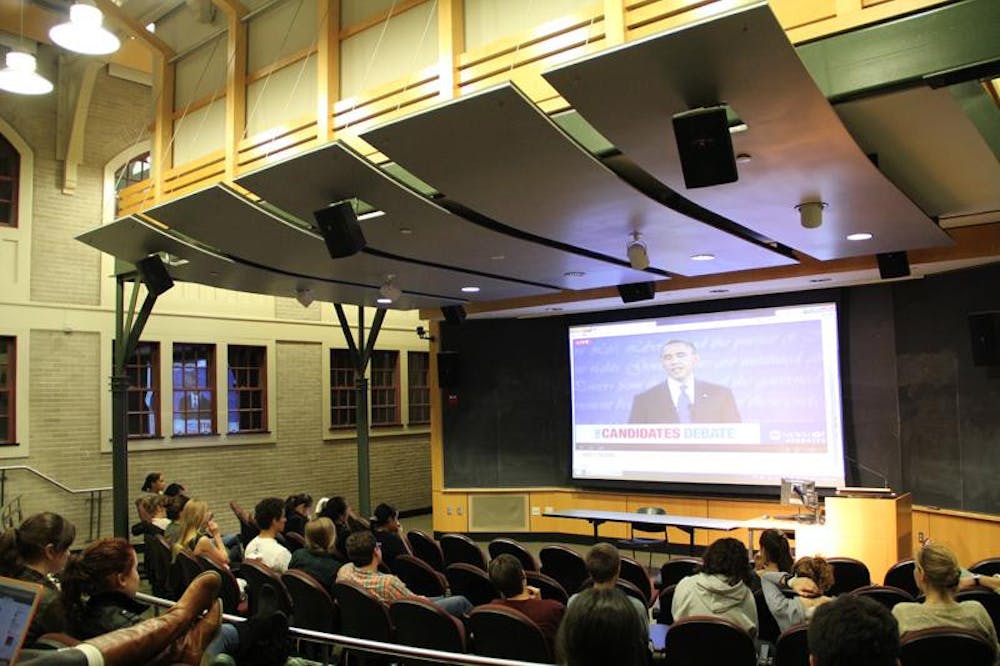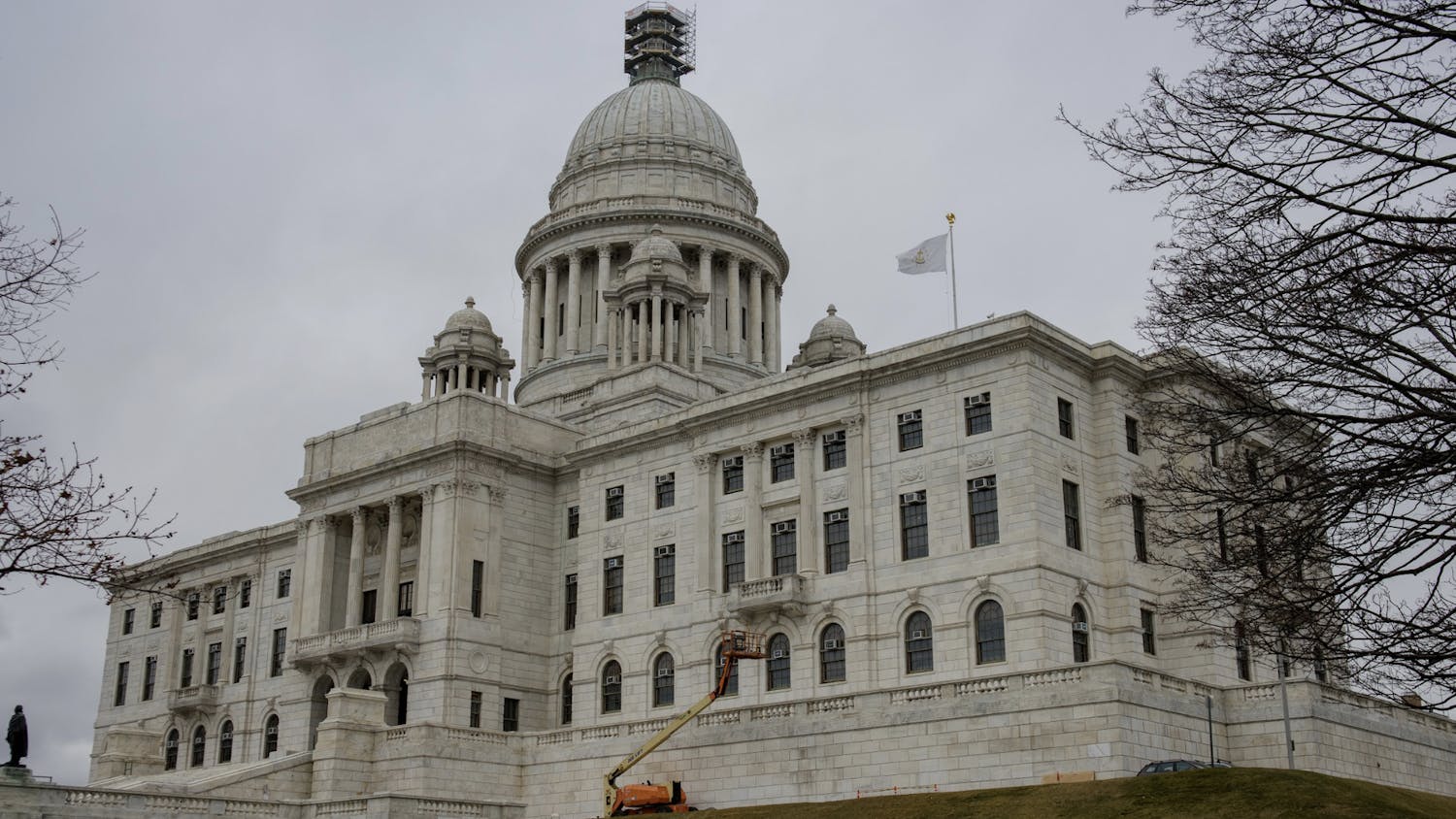President Barack Obama and former Massachusetts Governor Mitt Romney covered domestic topics in last night's presidential debate, including job creation, tax policy, deficit reduction, social welfare programs and healthcare policy. Social issues were not addressed. During the debate, Obama positioned himself as the heir to the Democratic policies of President Bill Clinton, who oversaw the economic boom of the 1990s, and aligned Romney with the "failed" Bush administration. Romney criticized Obama's administration for failing to create jobs, while instead focusing on a healthcare reform bill that raised taxes, cut Medicare and cost jobs. The debate was moderated by former PBS NewsHour anchor Jim Lehrer at the University of Denver. A screening was of the debate was held in Smith-Buonanno 106.
Each candidate let forth a barrage of facts and statistics during the debate, which the other candidate often disputed.
Job creation
Obama touted his administration's creation of five million jobs over the past 30 months despite inheriting an economy mired in a deep recession. He promised to take the money that was previously expended on the wars in Iraq and Afghanistan to cut middle class tax rates and increase investment in energy and education, including the hiring of 100,000 new math and science teachers.
Obama proceeded to criticize Romney for his "perspective that says if we cut taxes skewed toward the wealthy and roll back regulations that we'll be better off."
Romney criticized Obama for raising taxes on the middle class and also blamed the president for high gasoline prices and the national debt.
Romney also laid out several areas on which he would focus to bolster job creation. He said he would cut overhead in the Department of Education and "get those dollars back to the states and go to the workers so they can create their own pathways to get in the training they need for jobs that will really help them." He also reiterated his promise to cut taxes for individuals and corporations, closing tax loopholes to recoup the lost revenue. Third, he criticized the president for not supporting domestic energy sources like natural gas and coal. Developing energy independence could create 4 million jobs in the country, Romney said. Finally, he guaranteed that no tax reform bill passed under his administration would increase the federal deficit.
Taxation
Romney lambasted the president for his insistence on raising taxes on the wealthy. He argued that small businesses are often taxed at the individual rate and that an increase on the top earners would raise taxes on businesses that employ a majority of American workers.
Romney promised to cut taxes for high- and middle-income Americans, as well as for corporations, without adding to the national deficit.
Obama directed his criticism at Romney's claim that he could cut $5 trillion in taxes and provide an additional $2 trillion to the military over ten years in a deficit-neutral way.
"The average middle-class family with children would pay about $2,000 more," Obama said.
The president said he instead wanted to increase revenues by taxing the top earners, himself included, to pay for social welfare programs and vital investments without increasing the deficit.
Romney debated Obama's assertion that his tax cut plan would add $5 trillion to the deficit, saying he would not vote for his own plan if that was the case. Romney claimed that he would prevent the deficit from expanding by closing tax loopholes and exemptions that do not affect middle-class Americans. Obama refuted the notion that it was possible to find $5 trillion in savings by closing loopholes and said any attempt would raise taxes on the middle class.
Social welfare
While the rhetoric over Social Security was muted, as both candidates agreed the program was fundamentally sound, the candidates clashed over welfare.
Obama attacked Romney on his previously stated support for plans to turn Medicare into a "voucher system." Though Obama conceded Romney's plan would only affect future retirees - those 55 and younger - he argued "vouchers wouldn't necessarily keep up with health care inflation."
"It was estimated that this would cost the average senior about $6,000 a year," Obama said.
Even maintaining traditional Medicare alongside the new private option would leave seniors at the mercy of private insurance companies, he said.
"You are putting seniors at the mercy of those insurance companies," Obama said. "And over time, if traditional Medicare has decayed or fallen apart, then they're stuck."
Romney defended his proposal to create a private sector version of Medicare by touting the virtues of the free enterprise system. He went on to criticize the president for cutting $716 billion from Medicare in Obamacare - the name that both candidates embraced to describe Obama's signature health care law. "I want to put that money back in Medicare for our seniors," Rommey said.
Obama said he was able to cut $716 billion from Medicare "by no longer overpaying insurance companies (and) by making sure that we weren't overpaying providers."
Health care
Romney and Obama offered sharp contrasts for the future of Obamacare. While Romney did not say he would repeal every part of the law - promising to cover preexisting conditions and allowing young people to stay on their parents' health insurance until the age of 26 - he said he would repeal the bulk of it.
"When you look at Obamacare, the Congressional Budget Office has said it will cost $2,500 a year more than traditional insurance," Romney said. He pointed to Obama's 2008 pledge to cut health care costs by $2,500 to highlight the president's supposed failure.
Obama defended his signature law, saying he was proud that "we now have a system in which we have the opportunity to start bringing down costs, as opposed to just leaving millions of people out in the cold."
He added that "over the last two years, health care premiums have gone up - it's true - but they've gone up slower than any time in the last 50 years. So we're already beginning to see prog
ress."





